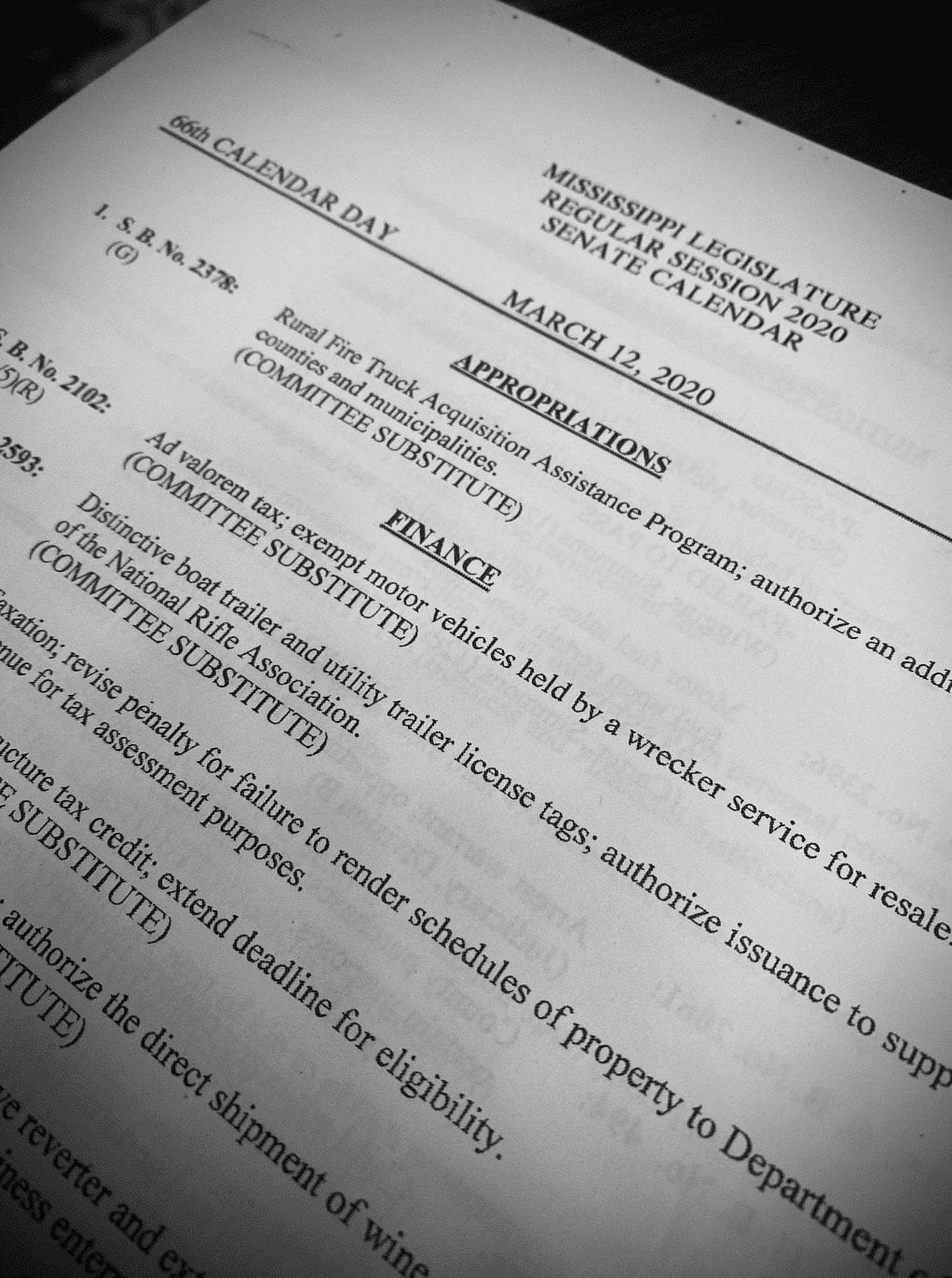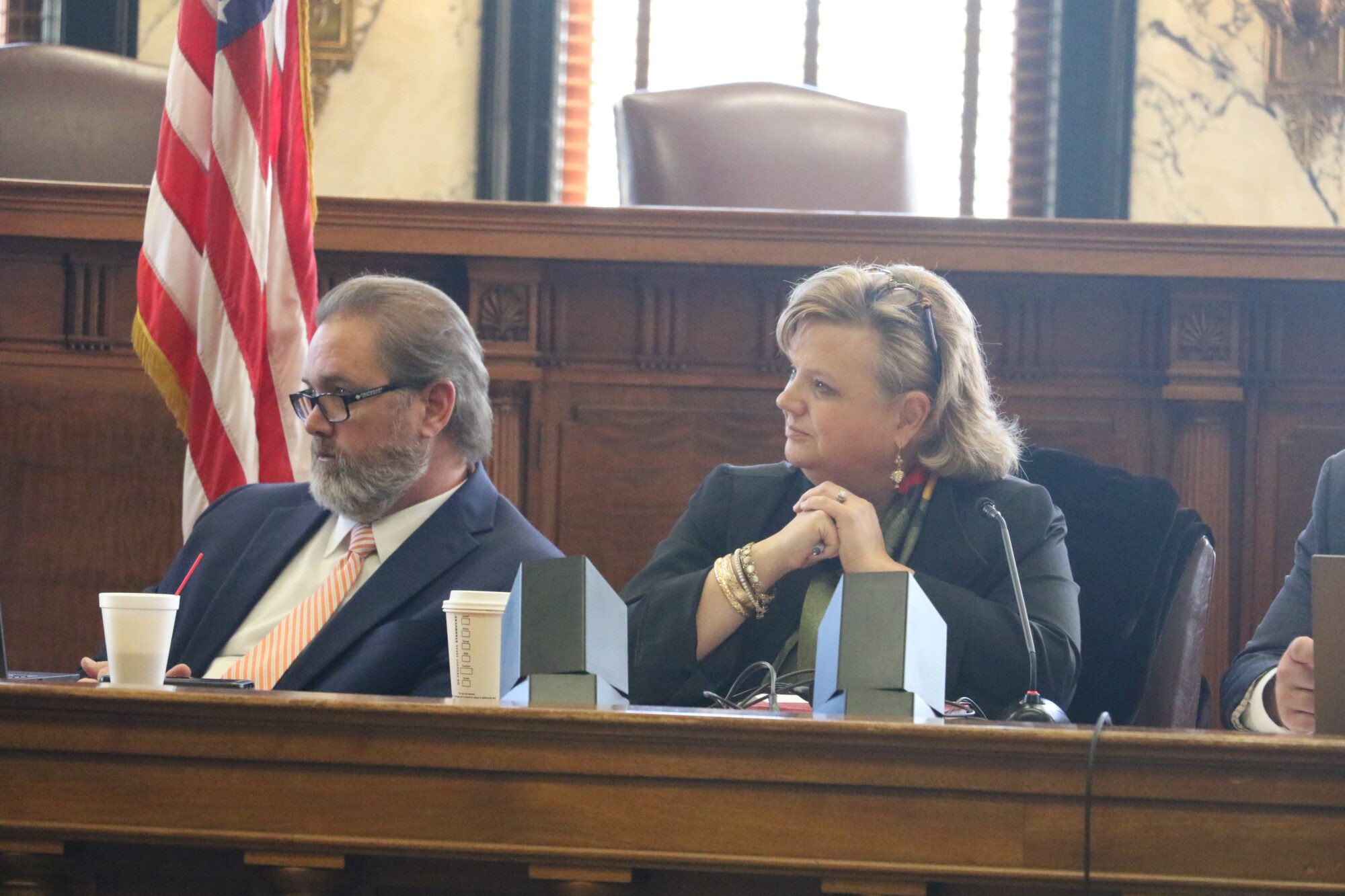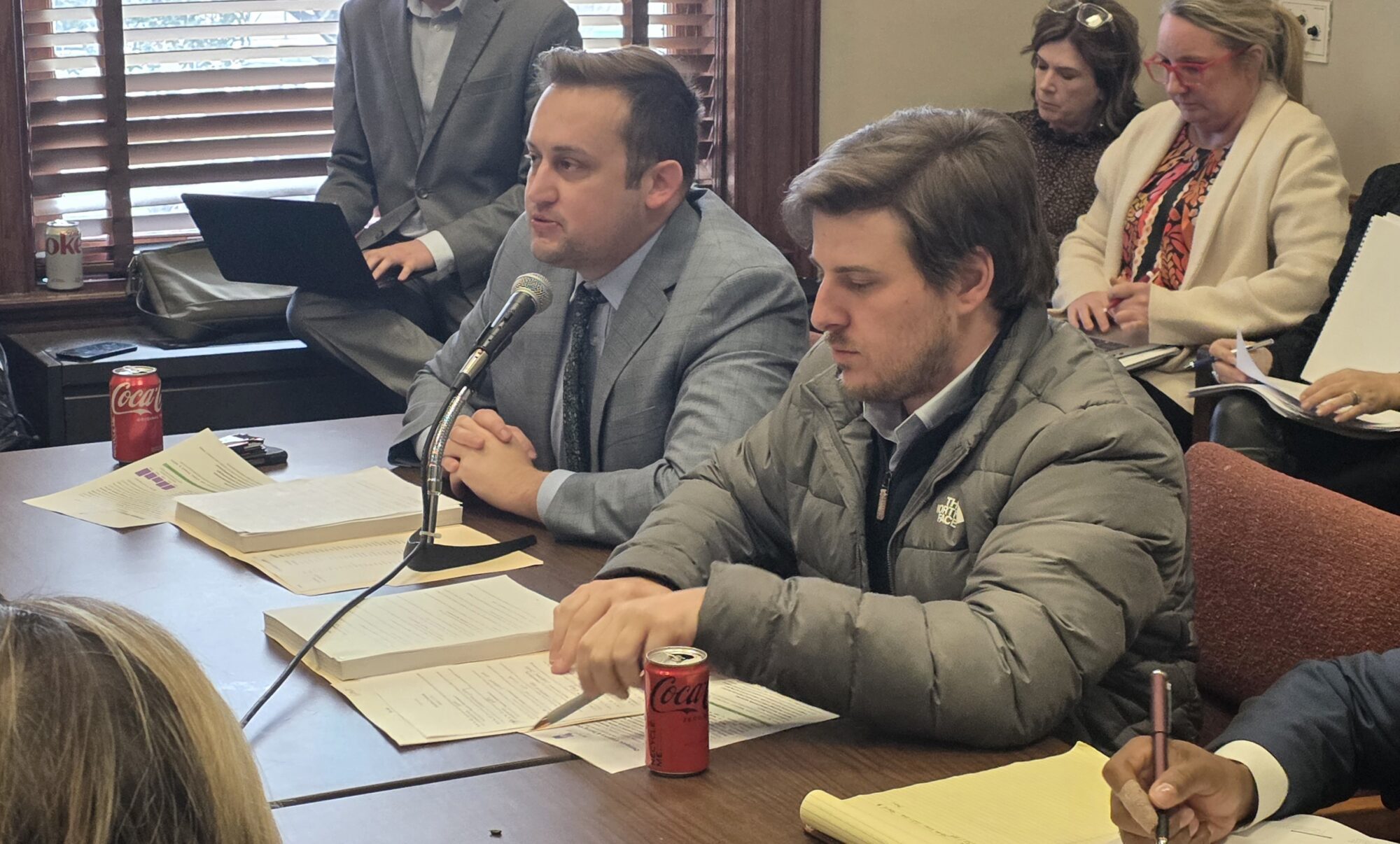
Senators and Representatives faced the first major floor action deadline on Thursday. After many long hours of debate, below is a list of bills worth noting where they stand in the process.
Marijuana Resolution
It may be the last bill passed on Thursday night, but it’s the first on our list. While this resolution wasn’t required to be passed in the Senate before tonight’s deadline, it was moved quickly through both chambers. The day before the deadline, Senators took it up in the Constitution Committee and passed it in moments, allowing it to brought up on the floor at any time.
HCR 39 will appear on the November 2020 ballot along with the public’s Initiative 65. Both aim to legalize the use of medical marijuana in Mississippi. Authored by Rep. Trey Lamar, he says the language in HCR 39 is much more narrow and appropriate to be made law in the state.
There was debate on the bill when Sen. Barbara Blackmon, Sen. Chris McDaniel and Sen. Derrick Simmons brought up concerns that this legislation would essentially kill any medical marijuana initiative. Sen. Blackmon compared it to the treatment of Initiative 42, when lawmakers offered Initiative 42A on the ballot and confused voters, she said.
“I hope the 228,000 people who voted to have this initiative on the ballot, bring another 228k and they will not be ‘hood winked” by this Legislature, like the body did in 2011 on Initiative 41 That did not allow the funding for our public schools” -Blackmon #msleg
— Yall Politics (@MSyallpolitics) March 13, 2020
She was of the opinion that this measure would do the same thing this year. Those in support of the alternate language in HCR 39 argue that the initiative language needs work and that is why they are offering the public a second option.
The bill was passed by a vote of 34 to 17 in the Senate and will be added to the November ballot.
Gang Bill
Sen. Brice Wiggins’ Anti-Gang bill SB 2459 made it to the Senate floor before the deadline. The bill provides a definition for criminal gang activity in the state, tightens penalties on gang recruitment and outlaws individuals from causing, encouraging, soliciting, recruiting or coercing someone into joining a gang.
“This issue is not black, white, rich or poor, Republican or Democrat,” Wiggins said. “It is one on which we find common ground, because gang recruiting, and its resulting crimes are causing irreparable harm to our state and has the potential to cost our state millions of additional dollars in incarceration costs.”
Sen. Derrick Simmons added an amendment to limit the bill to only allow those over the age of 18 to be charged. The amendment was passed as he pointed out this legislation is intended to target adults recruiting young people.
The bill passed on a vote of 36 to 16 with a minimal amount of debate.
IHL Board bills
The House took up two bills that would address the functionality of the IHL Board. First passed in the House, HB 870 would change how members of the board are appointed. Right now, the Governor of Mississippi has the authority to appoint all 12 members of the board. This bill will redistribute that power to the Governor with four appointments, the Lt. Governor with four and the Speaker of the House with four.
It passed on a vote of 78-41.
There will also be four members from each Supreme Court district. This bill is also tied to HCR 31 which would change the language on IHL in the Mississippi Constitution. It was taken up on deadline day and passed by a vote of 86 to 35.
Taken up after HB 870 was HB 1571 that will ensure all eight public universities have representation when selecting institution executives or university presidents. This bill establishes a seven-member search committee, six of which would be alumni from that university and one would be appointed by the IHL Board.
That bill passed by a vote of 95-22.
HCR 51 was attached to HB 1571 and was passed in the House by a vote of 102 to 17.
Both HCR 31 and 51 will be placed on the November ballot for voters to decided if the Senate concurs.
No shipment of wine to your home
In the final moments of Thursday nights debate in the Senate lawmakers chose to kill SB 2534 which would have allowed the shipment of wine to the buyers home address. The bill was handled on the floor by Sen. Josh Harkins before succumbing to the vote.
Many who argued against the bill said it would hurt small business retailers in the liquor and wine business, while others said it would increase profits for them since individuals would still be required to place the orders through retailers.
After just over an hour of back and forth arguments the bill died on a vote of 32 to 13.
Tourism to be its own department
Members of the Senate have made a move to create a separate state department for Tourism. Currently, Tourism is housed and operated under the Mississippi Development Authority. SB 2838 authored by Sen. John Polk passed on Tuesday.
The new department would come with its own board with an executive director who would oversee day to day operations. The new department will be responsible for the promotion, development and support services for the tourism industry in the state. It also shifts any MDA employees and equipment that are tied to Tourism allocating them to the new office.
Early Learning Collaboratives
SB 2286, The Early Learning Collaborative Act of 2013, was transmitted to the House after passage in the Senate. The bill authored by Senator Wiggins would prescribe minimum funding for kindergarten programs and authorize technical teacher and assistant teachers support services. The intent is also to increase funding for early learning each year.
The legislation also requires the Department of Education to create individualized professional development plans and curriculum for those age groups. These plans would be subject to a PEER Committee review who would then submit the findings to the Legislature.
Funding is set to increase twenty-five percent for four-year old children at the beginning of the 2022-2023 school year, with no less than $2,500 per student.
Computer Technology in school
HB 1165 would require that students from kindergarten through 12th grade have built in computer science curriculum. This does not include the already in place technology classes usually taken in 7th or 8th grade.
The push comes after recent increases in the job market for more skilled workers in information technology careers.
The legislation calls for the new curriculum to be in place by the 2022-2023 school year. There are currently 1,300 teachers in the state who are trained in computer science, but many more would have to participate in the course work to begin implementing it in the classroom.
“Life Equality Act” this years Abortion bill
This years abortion bill, titled the Life Equality Act (HB 1295), would prevent abortions from being performed based on gender, race or medical disability of a fetus. The bill does allow for medical exemptions.
The bill would also place criminal charges on physicians that perform these abortions knowingly, but would prevent the mother from being charged. The bill passed by a vote of 79-33 in the House.
Correctional Safety and Rehabilitation Act bill
Corrections chairman Sen. Juan Barnett was successful in getting his bill, the Mississippi Correctional Safety and Rehabilitation Act of 2020, out of the Senate before deadline. SB 2123 was passed by members after minor amendments were added.

What the bill does is prescribe conditions for parole eligibility for current inmates serving time. It would allow for offenders to submit for a parole hearing after serving 25% or ten years of their sentence, with the exception of life imprisonment inmates and sex offenders.
The bill contains a reverse repealer which insinuates more work will be done before it is released by lawmakers. The bill passed on a vote of 32-20 in the Senate.
Felony dog and cat abuse
Something Sen. Angela Hill has been working on for quite some time – at least seven sessions, this bill would make it a felony to torturously abuse a domesticated dog or cat. SB 2658 would revise the codes of the “Mississippi Dog and Cat Protection Law of 2011.”
Hill said the goal with this bill would be to upgrade the state’s law already in place to ensure that any torturous acts mentioned in the text such as crushing, suffocating, impaling, or burning could be charged as a felony on a first offense. Officers could also charge more than one count per incident and an offender would be prevented from owning a dog or cat for the next 15 years.
Hill told Senators that previous groups of legislation like this, such as Farm Bureau, were not opposed to the bill.
The bill will now go to the House where Hill says she hopes it is not double referred, which is often a death sentence.
Protecting Free Speech on College campuses
The House of Representatives passed a bill that would protect the rights of college students who choose to speak freely about causes and issues they believe in on campus.
The Mississippi House of Representatives adopted a bill today to ultimately protect the rights of college students to speak freely about the causes and issues they hold dear. The issue prevents universities from creating “free speech zones” and confining students to a particular location to speak their mind about a topic. They would also have to use ‘clear, published, content-and viewpoint-neutral criteria’ in restricting student speech and gatherings.
HB 1200 would not protect any kind of hate speech or that which would instigate violence towards others and disrupt campus life.
The bill passed by a vote of 66 to 53.
Voter proof of citizenship
SB 1670, which would have required for voters to show proof of citizenship, a bill supported by new Secretary of State Michael Watson, was left on the calendar on deadline day. This action effectively killed the bill.
Equal Pay
Handled by Senator Sally Doty, SB 2522 would require for the equal pay for individuals of the opposite sex doing the same job. There is a Federal Equal Pay Act that was enacted in the 1960’s and since then every other state has implemented one, except Mississippi.
Doty says the bill she drafted has very narrow language and pertains to earnings being equal when a man or woman hold the same job. However, if the job is paid based on other criteria like seniority, merit system or any other reason other than sex, it would not be applicable. The bill also contains a reverse repealer.
“I think it does send a message to women in Mississippi that they should be treated equally in the workforce,” said Doty. She added that it could cause some employers to really look at their pay scale and make changes.
Infertility Coverage
A bill was offered in the House to create a pilot program for those insured through the state to require coverage to encompass infertility treatments. HB 837 was offered by Rep. Missy Magee who said that policies would only increase an average of $1.57 to $3.57 a month.
This would only apply to those on the state health plan at this time.
An amendment was added to also include the coverage of proton therapy treatment under state insurance. This therapy is scientifically said to be more effective than radiation when treating cancer patients but could be a 30% increase in cost.
The bill was held on a point of order but was later passed by a vote of 95 to 22.
















